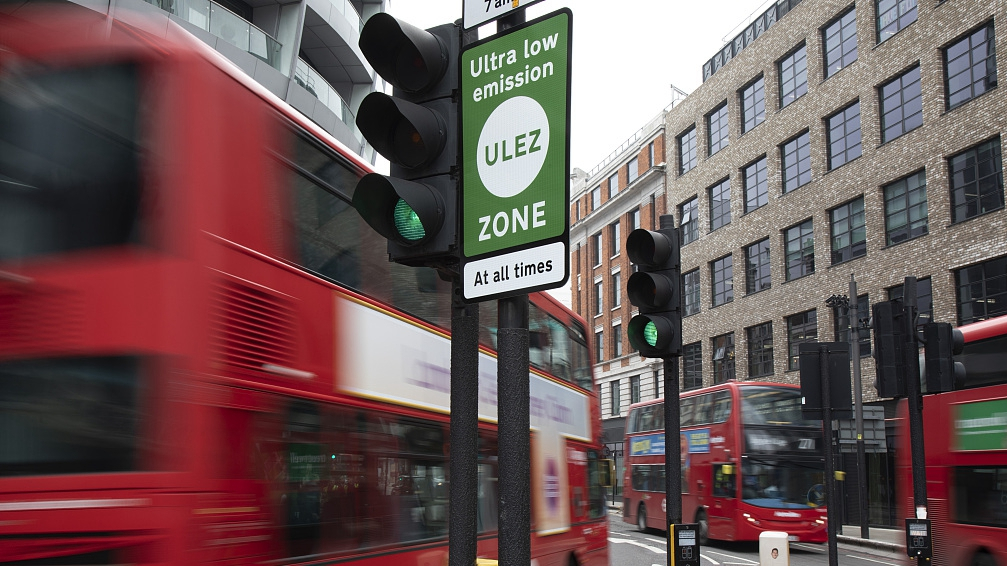
Environment
21:31, 09-Apr-2019
London introduces world's first ultra low emission zone
By Juliet Mann
02:32

London is taking drastic measures to curb air pollution. It has become the first city in the world to introduce an Ultra Low Emission Zone (ULEZ).
Under the scheme, which will operate 24 hours a day all year round, drivers of the most polluting small cars will have to pay an extra 12.50 pounds to enter the center of the town, on top of the daily congestion charge of 11.50 pounds. Bigger vehicles will pay 100 pounds a day.
The Mayor of London, Sadiq Khan, has said the city's toxic air is a public health emergency.
“I refuse to stand back as thousands of Londoners breathe in air so filthy that it shortens our life expectancy, harms our lungs and worsens chronic illness,” he said.
Recent studies by the University of Oxford have shown the health damage from cars and vans costs 6 billion pounds annually to the UK National Health Service, with the bill from London vehicles alone totaling 650 million pounds a year.
The ULEZ is part of a package of measures to clean up the capital's air, ultimately encouraging a change in people's behavior and getting them to drive cleaner cars.
“London has illegal levels of air pollution at the moment and two million Londoners are living in that toxic air. The Ultra Low Emission Zone, as well as other measures the mayor is introducing, like cleaning up our buses and taxis, will mean a 45-percent emissions reduction in central London and, by 2025 for example, no schools will be in areas of illegal pollution from the current 450 we have at the moment,” said Shirley Rodrigues, London's Deputy Mayor for Environment and Energy.
The move has received a mixed response from the public. Some people have bought new vehicles to comply with the new anti-pollution rules, while others are considering to do the same to avoid hefty fines for driving into the new controlled zone.
“I've just bought a new car. We have to deal with it, don't we?” said one tradesman, while a man on a moped was quick to explain that other European cities, such as Amsterdam, have a thriving bike and scooter culture, which London would do well to emulate.
Others were not so keen, blasting the polluter-pays concept as flawed. “In my opinion, it is a money-making thing, nothing to do with (pollution) at all. If it was so bad, they would ban traffic altogether. Instead, (drivers can) pollute as much as you like so long as you pay for it!” said one motorist.
Ever since the scheme was announced, there has been criticism about the expense it will bring to individuals and businesses.
All buses entering the congestion zone are ULEZ compliant while the capital's black cab drivers are exempt. This has raised the ire of private hire drivers who will have to pay the fee, if their vehicles are non-compliant. Some staged protests at London Bridge and Westminster. They've also launched a legal challenge against the mayor on discrimination and human rights grounds, alleging that most of the drivers affected are from black, Asian and other minority groups.
Uber driver Muhamed Ali, a private hire driver for around a decade, believes the new charges put his livelihood at peril.
“I feel so frustrated and angry because it is going to kill my business and I don't know how to feed my family. I bought this car to feed my family and now the mayor is telling me I have to sell it. It is the end of my driving to be honest,” he said.
Transport for London's initial estimates shows 100,000 cars, 35,000 vans and 3,000 trucks might be affected by the expanded zone and tighter standards every day.
While other cities like Paris and Athens are trying all-out bans on diesel by 2024, and Rome allows no vehicles at all in its old town Piazza del Popolo, London's approach is one of the most radical anti-pollution schemes in the world.
For private hire drivers like Ali, it might mean the end of the road. But the mayor's office points to Kings College University research, which warns if we do nothing, it will take 193 years to bring London air to within legal limits.
Data reveals that every part of London exceeds World Health Organization air quality guidelines. The introduction of the ULEZ is expected to reduce emissions in central London by an additional 20 percent this year.
The British Lung Foundation has welcomed the introduction of the ULEZ, saying it could dramatically improve people's quality of life.
The impact on schools will also be significant. By the end of the year, 19 schools in central London and 42 schools across London will no longer be in areas exceeding legal limits.

SITEMAP
Copyright © 2018 CGTN. Beijing ICP prepared NO.16065310-3
Copyright © 2018 CGTN. Beijing ICP prepared NO.16065310-3